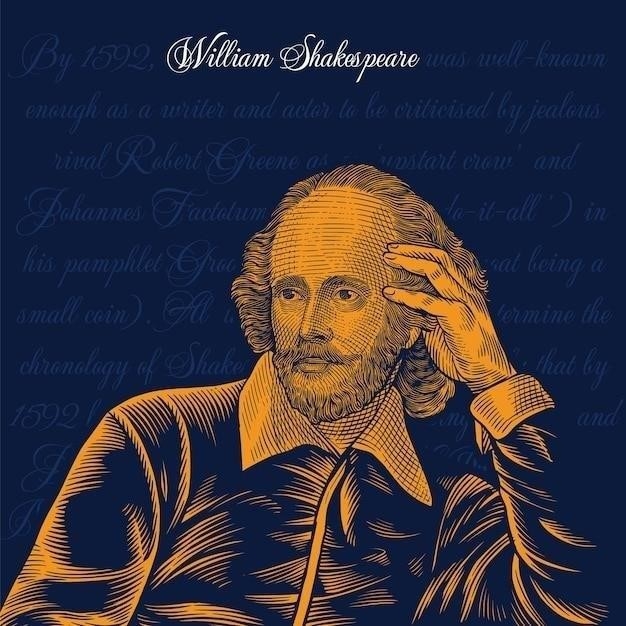- Alexander Pushkin⁚ A Short Biography
- Early Life and Family
- Literary Career and Major Works
- Exile and Later Years
- Legacy and Influence on Russian Literature
- Interesting Facts about Pushkin
- Interesting Facts
- A Legacy Rooted in Africa
- A Duel that Shocked a Nation
- A Literary Prodigy
- Значимые даты
- Early Life and Education (1799-1817)
- Literary Rise and Exile (1817-1826)
- Later Years and Legacy (1826-1837)
Alexander Pushkin⁚ A Short Biography
Aleksandr Sergeyevich Pushkin (1799-1837) was a Russian poet‚ playwright‚ and novelist. He is considered by many to be the greatest Russian poet and the founder of modern Russian literature.
Early Life and Family
Alexander Sergeyevich Pushkin was born on June 6‚ 1799‚ in Moscow‚ Russia‚ into a prominent noble family. His father‚ Sergey Lvovich Pushkin‚ was a descendant of an old noble family with a military background. His mother‚ Nadezhda Ossipovna Gannibal‚ was the granddaughter of Abram Petrovich Gannibal‚ Pushkin’s African great-grandfather. Gannibal was a fascinating figure who was born in Africa‚ enslaved‚ and eventually gifted to Peter the Great‚ the Tsar of Russia. He rose to become a prominent military engineer and general in the Russian army under Peter the Great’s patronage.
Pushkin’s family background exposed him to both Russian high society and a rich cultural heritage. While his upbringing provided him with access to education and the world of literature‚ it also exposed him to the complexities of Russian social life and the dilemmas faced by the nobility.
From a young age‚ Pushkin displayed a precocious talent for literature. He was raised speaking both French and Russian and was particularly influenced by the works of French classicism. His family background‚ coupled with his early exposure to literature and different languages‚ played a significant role in shaping his worldview and literary sensibilities.
Literary Career and Major Works
Alexander Pushkin embarked on his literary journey at a young age‚ publishing his first poem at the age of fifteen. His time at the Imperial Lyceum at Tsarskoye Selo‚ a prestigious school for aristocratic youth‚ proved to be a formative period where he honed his writing skills and cultivated a passion for literature. He became immersed in the world of poetry‚ drawing inspiration from European Romantic writers and immersing himself in Russian folklore and history.
Upon graduating from the Lyceum in 1817‚ Pushkin’s literary career began to flourish. He became known for his rebellious spirit and sharp wit‚ often reflected in his early poems that challenged societal norms and political authority. His works‚ infused with Romantic themes of individualism‚ passion‚ and freedom‚ resonated with a generation yearning for social change.
Pushkin’s major works are celebrated as cornerstones of Russian literature. His most acclaimed works include the verse novel «Eugene Onegin‚» a masterpiece that captures the essence of Russian society in the 19th century‚ and the historical drama «Boris Godunov‚» which delves into the complexities of power and ambition. His prolific writing extended to short stories‚ poems‚ essays‚ and plays‚ each showcasing his unparalleled mastery of language‚ keen observations of human nature‚ and profound exploration of Russian history and culture.
Exile and Later Years
Alexander Pushkin’s literary prowess and outspoken nature often put him at odds with the Russian government. His writings‚ imbued with liberal ideas and critical of the Tsarist regime‚ led to periods of exile that significantly shaped his life and literary output.
In 1820‚ Pushkin was exiled from St. Petersburg for his poems deemed politically subversive. He spent six years in southern Russia‚ a period that inspired some of his most celebrated romantic works. The vibrant landscapes and cultural tapestry of the Caucasus region left an indelible mark on his writing.
While exile brought about hardship and isolation‚ it also provided Pushkin with a unique perspective on Russian society. During this time‚ he delved deeper into Russian folklore and history‚ themes that would become central to his later works. He produced a prolific amount of writing‚ including the verse novel «Eugene Onegin‚» which cemented his status as a literary giant.
Pushkin was allowed to return to Moscow in 1826‚ but he remained under constant surveillance by the Tsarist authorities. Despite the restrictions‚ he continued to write prolifically‚ exploring themes of love‚ loss‚ and the complexities of human existence. His later works often reflected a growing sense of disillusionment with the political climate and a deepening exploration of Russian identity.
Legacy and Influence on Russian Literature
Alexander Pushkin’s impact on Russian literature is immeasurable. He is hailed as the father of modern Russian literature‚ credited with transforming the literary landscape and shaping the Russian language as a literary medium. His influence extends far beyond his lifetime‚ continuing to inspire generations of writers and leaving an indelible mark on Russian culture.
Pushkin’s genius lay in his ability to capture the essence of Russian life‚ the soul of its people‚ and the beauty of its language. He seamlessly blended literary traditions‚ drawing inspiration from European romanticism while infusing his works with a distinctly Russian character. His writings resonated with a wide audience‚ transcending social barriers and solidifying his status as a national poet.

One of Pushkin’s most significant contributions was his pioneering use of vernacular language in his writing. By incorporating everyday speech patterns and colloquialisms‚ he revolutionized Russian literature‚ making it accessible to a wider audience and paving the way for realism as a dominant literary movement in Russia. His works became a cornerstone of Russian education‚ shaping the literary tastes and cultural identity of generations to come.
Interesting Facts about Pushkin
Beyond his literary achievements‚ Alexander Pushkin’s life was filled with intriguing details and fascinating anecdotes that contribute to his enduring legacy. Here are a few interesting facts about the renowned poet⁚
* African Heritage⁚ Pushkin was very proud of his African heritage‚ which stemmed from his great-grandfather‚ Abram Petrovich Gannibal. Gannibal‚ originally from Africa‚ was gifted to Peter the Great and rose through the ranks to become a prominent military engineer and general in the Russian army. Pushkin’s African ancestry became a source of inspiration for his writings‚ particularly in his exploration of themes of identity and belonging.
* Dueling Fatality⁚ Pushkin’s life was tragically cut short at the age of 37 in a duel with Georges d’Anthès. D’Anthès‚ a French officer‚ had made advances towards Pushkin’s wife‚ leading to a duel that proved fatal for the beloved poet. The duel and Pushkin’s untimely death shocked Russian society and cemented his status as a tragic hero in Russian culture.
* Prolific Writer⁚ Pushkin was an incredibly prolific writer‚ producing a vast body of work despite his relatively short lifespan. His repertoire includes poems‚ novels‚ short stories‚ plays‚ essays‚ and even historical works. His ability to excel across different genres solidified his reputation as a literary genius.

Interesting Facts
Beyond his literary genius‚ Alexander Pushkin’s life was a tapestry woven with intriguing details and captivating anecdotes. These lesser-known facets of his life provide a glimpse into the man behind the pen‚ revealing a complex and fascinating individual who transcended the boundaries of his time.
A Legacy Rooted in Africa
One of the most intriguing aspects of Pushkin’s heritage is his African ancestry. His great-grandfather‚ Abram Petrovich Gannibal‚ was a remarkable figure who journeyed from Africa to Russia as a young boy. Gifted to Peter the Great‚ Gannibal’s intelligence and charisma captivated the Tsar‚ leading to a life of extraordinary opportunities.
Gannibal excelled in his studies‚ becoming a skilled military engineer and rising through the ranks to become a prominent general in the Russian army. He played a pivotal role in shaping Russia’s military prowess during a period of significant expansion and modernization. Pushkin‚ deeply proud of his great-grandfather’s achievements‚ often referred to Gannibal in his writings‚ immortalizing his legacy.
A Duel that Shocked a Nation
Tragically‚ Pushkin’s life was cut short at the peak of his literary career. In 1837‚ at the age of 37‚ he was fatally wounded in a duel with Georges d’Anthès‚ a French officer serving in the Russian army. The duel stemmed from a series of events involving Pushkin’s wife‚ Natalya Goncharova‚ who had become the object of d’Anthès’ affections.
The duel‚ a tragic consequence of societal norms and wounded pride‚ sent shockwaves through Russian society. Pushkin‚ revered as a national treasure‚ was mourned by people from all walks of life. His untimely death cemented his status as a literary martyr‚ and the circumstances surrounding the duel continue to fascinate and intrigue historians and literary enthusiasts alike.
A Literary Prodigy
Pushkin’s literary talent was evident from a young age. He began writing poetry as a child‚ and his early works displayed a remarkable maturity and command of language. His time at the prestigious Imperial Lyceum at Tsarskoye Selo further nurtured his gift‚ providing him with a solid foundation in literature and the classics.
Throughout his life‚ Pushkin demonstrated an exceptional capacity for language and storytelling. He effortlessly moved between genres‚ producing a diverse body of work that includes poems‚ novels‚ short stories‚ plays‚ and even historical accounts. His ability to capture the nuances of human emotion‚ the beauty of the natural world‚ and the complexities of Russian society solidified his reputation as a literary prodigy.

Значимые даты
Alexander Pushkin’s life‚ though tragically cut short‚ was marked by significant milestones that shaped his literary journey and left an enduring legacy on Russian culture. These dates offer a glimpse into the pivotal moments that defined his personal and professional life‚ highlighting his evolution as a writer and his impact on Russian society.
Early Life and Education (1799-1817)
- June 6‚ 1799⁚ Alexander Sergeyevich Pushkin is born in Moscow‚ Russia‚ into a prominent noble family. His family’s social standing and literary inclinations would play a significant role in shaping his early life and future career.
- 1811⁚ At the age of twelve‚ Pushkin enters the prestigious Imperial Lyceum at Tsarskoye Selo‚ a school for aristocratic youth. The Lyceum provided him with a rigorous education and fostered his passion for literature.
- 1817⁚ Pushkin graduates from the Lyceum‚ having already gained recognition for his poetic talent. His early poems‚ often imbued with youthful idealism and Romantic themes‚ captivated the attention of literary circles in St. Petersburg.
Literary Rise and Exile (1817-1826)
- 1820⁚ Pushkin’s poem «Ruslan and Ludmila‚» a romantic fairy tale‚ brings him widespread acclaim. However‚ his politically charged verses‚ critical of the Tsarist regime‚ lead to his exile from St. Petersburg. He is sent to southern Russia‚ where he spends six years exploring new literary themes and drawing inspiration from the region’s vibrant culture and landscapes.
- 1826⁚ Following the death of Tsar Alexander I‚ Pushkin is allowed to return to Moscow. However‚ he remains under the watchful eye of the Tsarist authorities‚ his movements and writings closely monitored.
Later Years and Legacy (1826-1837)
- 1831⁚ Pushkin marries Natalya Goncharova‚ a young woman of considerable beauty. Their relationship‚ while passionate‚ is also marked by societal pressures and jealousies that will have tragic consequences.
- 1837⁚ At the age of 37‚ Pushkin is fatally wounded in a duel with Georges d’Anthès‚ a French officer serving in the Russian army. The duel‚ a tragic consequence of societal norms and wounded pride‚ shocks the nation and cuts short the life of one of Russia’s greatest literary talents. Pushkin’s death is met with an outpouring of grief‚ cementing his status as a literary icon and a symbol of Russian cultural identity.








